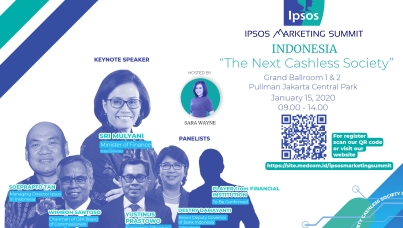Flair Indonesia 2020 - Now or Never
Indonesia has been in the news this year for mostly tragic reasons. Natural disasters with Tsunami, floods, volcanic eruptions, earthquakes .... Technical disasters with the Boeing 737 MAX (Lion Air) crash or collapse of a mine… In all cases, human disasters that make us forget other realities, positive, encouraging, stimulating.
It is, as we wrote in our first edition of Flair, the paradox, or even a sort of fatality for Indonesia: to be known for tragic events or, conversely, to be famous for magnificent landscapes and a paradise to get married. But we cannot reduce a country of 268 million people to two stereotypes: dramas or glitters.
Some figures give another dimension to Indonesia.
- Demography: Population increased by 1.1 %, which is above regional average, to a total of 266,794,980 in 2018. Indonesia had the 4th highest total population in the world in 2018.
- Economy: Real GDP is forecast to increase by 5.3% p.a. from 2018 to 2023. Inflation decreased from 2017 to 2018 (3,8% to 3,4%) and Central Bank interest rates rose.
- Infrastructures: The Jakarta underground was inaugurated at the end of March, a skytrain is nearing completion, new bus lines are created to relieve congestion in the capital city. While other countries are spending the bulk of their investments on their capital, it is at the same time a question of lifting the main eight (Surabaya, Medan, Bandung, Bekasi, Tangerang, Makassar & Depok) and of course Papua. The airport built near Lake Toba is another example of this development.
- Employment: The number of unemployed is steadily declining, standing at around 5.6% in 2016, compared to more than 7% in 2010. Moreover, the unemployment rate in Indonesia is expected to fall further for establish at approximately 5% as of 2019 .
- Services: It accounted for 43.6% of GDP in 2017. With US$12.5 billion, travel services accounted for 52% of total services export in 2017. The transaction value in the FinTech market amounts to US$27,776.4m in 2019.
- Technologies: 66 million people have Internet access, ie the equivalent of the populations of Thailand or France. 45.4% used the internet and there were 1 73.6 mobile cellular subscriptions per 100 people.
- New business: eCommerce revenues are expected to have a positive annual average growth of 9.3% up to 2023. With US$16,011.8m and a share of 50.6%, eTravel generates the highest digital revenues.
- Tourism: In total, after 11, 52 million tourists in 2016, 14.04 million in 2017, 15.8 million visited Indonesia in 2018, + 12, 5% / 2017. The month of December, period of high tourist season, recorded 1.41 million visitors (+ 22% compared to the previous year). Indonesia is now the first rank as the world's halal tourist destination along with Malaysia, long unbeatable (Global Muslim Travel Index).
Whether we look at economic or trade statistics, Indonesia is now facing a choice that will determine its weight in the region, or even in the world. Either catch up (which is already huge, given the regional disparities, social fractures, poverty of part of the population), or give a boost that surprises and gives Indonesia a very proactive image.
Let’s mention three examples: sport, business, sustainability. The 18th Asian Games (Pesta Olahraga Asia 2018) was held in Indonesia, in Jakarta and Palembang, from 18 August to 2 September 2018 with the participation of 11,720 athletes, the second largest multi-sport event after the Olympic Games.This event gave the Indonesians a very flattering picture of their country, its ability to organize grandiose events, to be recognized as a real power. Their traditional humility may have been jostled, in the positive sense of the word.
The very fast growth of the E-Commerce, providing all products in one place: fashion, electronics, toys, household needs, furniture… Many people prefer now shopping online rather than offline, enjoying in parallel discounts and bonuses on purchases. The time lost in traffic jams and the heat do not give you the desire to spend hours waiting to go to a shop…
The closure of shopping malls, unthinkable a few years ago, is becoming a reality that forces retail players to adapt and innovate even more quickly. This race competes inventiveness: the off-line trade has the advantage of the customer-experience, the emotions in the purchasing process, the quality of the relationship with the sales staff. No wonder mystery-shoppers studies are booming, especially in sectors like luxury. But the average players have a lot to do to engage their consumers.
The idea that Jakarta can no longer be both a business centre and an administrative capital. To centralize everything in Jakarta would unbalance the country, would be an aggravating factor of pollution, would finally have less positive economic and social consequences than imagined. This is not the first time the idea has been mentioned, but to act by keeping business activities in Jakarta and moving governmental and administrative activities to another city would be revolutionary.
Whether for climatic, environmental, political reasons, changing capital has a huge human, cultural and geographic impact. Of course in Sumatra, no one will be happy to see the capital go to Kalimatan, but the risk is that 95% of North Jakarta will be submerged in few years, 40% of Jakarta's surface being below sea level.
Other countries have taken the plunge. In 1999, Malaysia moved its capital from Kuala Lumpur to Putrajaya because of it amazing pollution. In 1970, Belize changed capital to Belmopan because Belize City, the former capital, was devastated by a hurricane in 1961. In Japan, we remember the former Kyoto capital moved to Tokyo in 1868 and in France, Versailles, after Paris, was the seat of the Kingdom from 1683 to 1789.
Both points (even n°3 in not absolutely sure) show that Indonesia can be an innovative and rupturistic country. But, in terms of perception, the gap between the country’s realities and the country’s image is still important, hence our title, provocative thinking, for our new edition: « Now or never », echoing to catch up or to radically boost.
« Now », because the signs for recognition and a new image are on the table:
- In economic and social terms: establishment of an economic dynamic which helps the creation of a real middle class with more purchasing power, which in turn implies a social model which excludes nobody and establishes gender equality.
- In terms of land settlement: construction of highways and transportation systems linking cities and opening up regions, diminishing disparities between rural and urban areas, and reaching a balance in terms of incomes and lifestyle.
- In terms of architecture: development of cities, building spectacular urban centres - amazing condominium and skyscrapers, more and more high-end residential areas. All in all, innovation of high environmental quality.
- In terms of marketing and business: proliferation of brands, advertising, communications and media. Also more shopping malls and luxury shops, with widespread distribution, stimulating the desire to purchase in each location.
- In terms of environment, per the signature of the COP 21 agreement and actions to solve the point of the pollution. Today, because air quality in Jakarta recorded worse conditions than notoriously polluted cities such as Delhi and Beijing, a group of activists and environmentalists in Jakarta did not hesitate toto sue the Indonesian government .
« Never », if the perception remains more solid than the reality, if Indonesia continues to be perceived as a modest country and Indonesian as humble people.
Of course, « Never Say Never Again » , because the situation is neither so tense nor so urgent and dramatic, Indonesia moving at its own pace; but if we want to reveal the full potential of the fourth world population, we must move up a gear to be recognize as a fully powerfull country.
It is the purpose of our Flair n°2. Even remembering the quote "tong kosong nyaring bunyinya" or "empty barrel makes a lot noise", Indonesian have too many qualities to stay longer silent and must fill the barrel! It is the best way to change the game.

![[Webinar] One Mind Many Truths: An Ipsos APAC Webinar on Generations](/sites/default/files/styles/list_item_image/public/ct/event/2023-10/MicrosoftTeams-image%20%2810%29_0.png?itok=z8oqhKPD)

